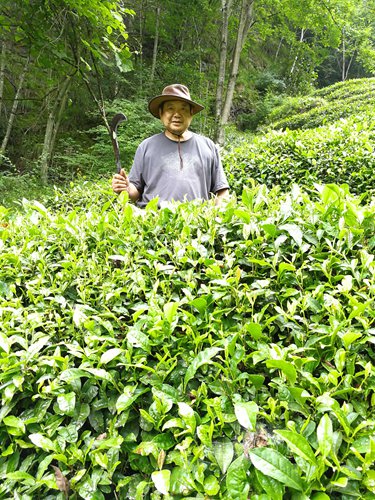HOME >> CHINA
Writer Gu Qingsheng dedicates his life to documenting the natural wonders of Shennongjia
By Dong Feng Source:Global Times Published: 2019/6/20 19:33:41

Gu Qingsheng works at his tea farm in Hongju village, Shennongjia of Central China's Hubei Province. Photo: Courtesy of Gu Qingsheng
The giant panda is probably one of the most famous symbols of China. But the golden monkey, an ancient species known for its gorgeous back hairs, is also considered one of the country's "national treasures."
This shy and mysterious creature lives in mountain forests in central and western China and is rarely seen.
However, one man has made it his mission to lift the veil on the mystery of the golden monkey through his vivid descriptions and photographs.
Gu Qingsheng, a writer with Chinese National Geographic, has observed golden monkeys in the Shennongjia forest of Central China's Hubei Province for more than 11 years.
Shennongjia is the highest peak in the nature reserve, standing at 3,106 meters above sea level. It is named after Shen Nong, one of the three great heroes of Chinese culture, the other two being the Yellow Emperor and Fu Xi, the revealer of the eight trigrams.
This is where Shen Nong, or God Farmer, tasted hundreds of herbs and determined which were medicines and which were poisons, according to the Herbal Classic, a historical Chinese text on herbalism and medicine that is attributed to the mythical figure.
Shennongjia is also home to species such as the golden or snub-nosed monkey, Chinese giant salamander, and clouded leopard, and is an important historical site for botanical research.
In December 2006, Gu teamed up with the Dalongtan scientific research team of the Shennongjia Golden Monkey Conservation Research Center and observed the golden monkey for one month.
Gu has compiled the research team's observations from the past 10 years into a book titled Golden Monkey Tribe.
Gu himself conducted in-depth observations of the monkey tribe three times between 1991 and 2007. For the first time, he was able to observe the golden monkey's society, family and living habits.
Previous studies had led to a hypothesis that the tribe was ruled by a king. Male monkeys fight for the position, and once a younger monkey takes the throne, the tribe begins a new chapter.
But after analyzing the power structure of the Dalongtan Golden Monkey Tribe, which consists of multiple families, Gu and other researchers believe that in each family there are male leaders but no king.
After wrapping up his inspection of Shennongjia, Gu found it hard to say goodbye to the place, which he later described as a paradise in his latest book.
Now he has transformed from a writer into an expert on golden monkey research, tea, beekeeping and botany.
Changing roles
In 2009, when everyone else was busy chasing fortune, Gu made a decision to leave Beijing and settle down in the mountains to start. He wanted to do something poetic and meaningful, and made writing and planting tea his lifelong pursuits.
"The more I get to know about Shennongjia, the more humble I feel about myself in front of nature," Gu told the Global Times.
"Planting is all about aesthetics," Gu's WeChat status reads.
From urban prose writer to a tea farmer in Shennongjia then a Taobao teashop owner, Gu is continuously changing roles, keeping his Spartan life in the mountains filled with fun.
He also exchanges his ideas on planting with local farmers who were hired to help him. After learning from them, the village now plants orchids and roses next to the tea.
He has learnt the entire process of stir-firing tea and created his own branded authentic tea products that can be bought on Taobao, China's leading e-commerce platform.
With his keen sense of observation, he continues to be fascinated by and learn about Shennongjia. His latest book is filled with details and pictures of seasonal trees, blossoms, birds, bears and fish.
Gu is concerned about the ecology in the Shennongjia forest and food safety. However, He believes it is unrealistic to try and make farmers invest more in environmental protection measures, when their focus is on maximizing output. To get rid of pests, Gu raised birds around his farm instead of using pesticides.
"There is a snake that's over two meters long in my farm. I planted trees that release a certain smell to keep the snakes and hedgehogs away, as they are all nature's children," he told the Global Times.
He has persuaded farmers in his area not to use chemical fertilizers, resulting in higher prices for organic fertilizer.
Newspaper headline: Monkey magic
RELATED ARTICLES:
Posted in: PROFILE